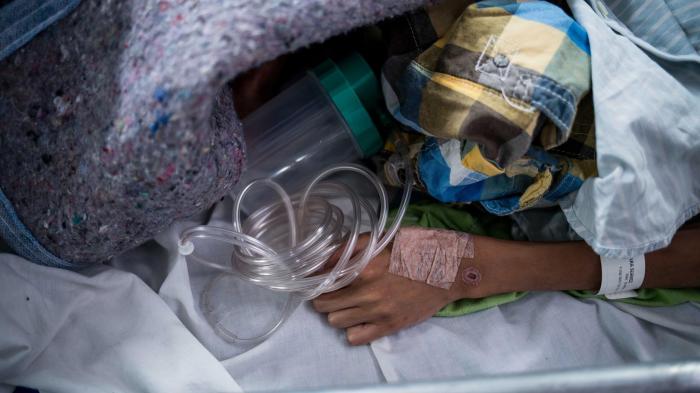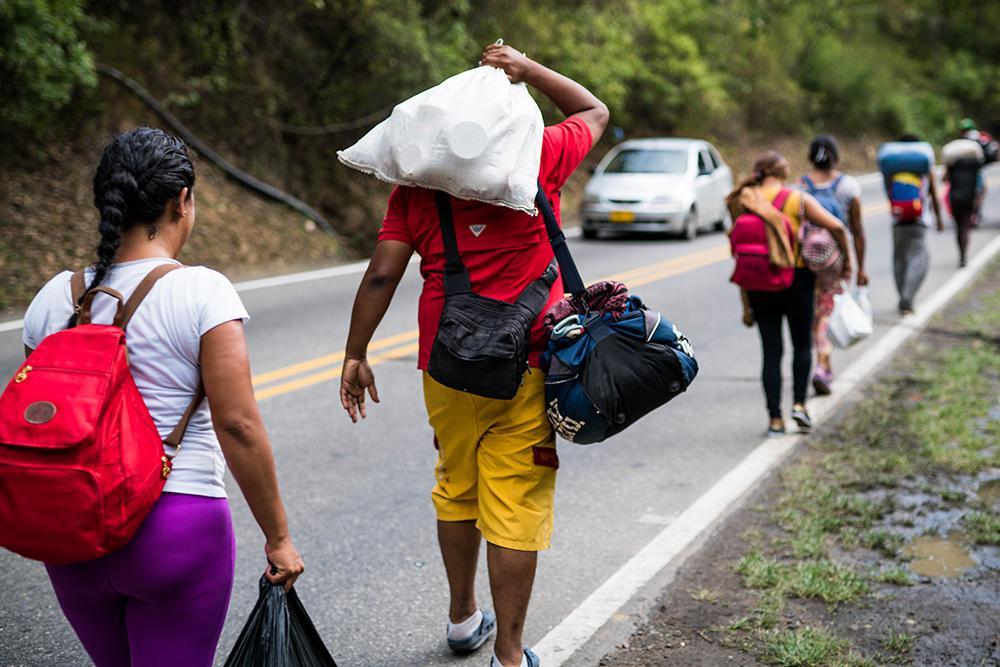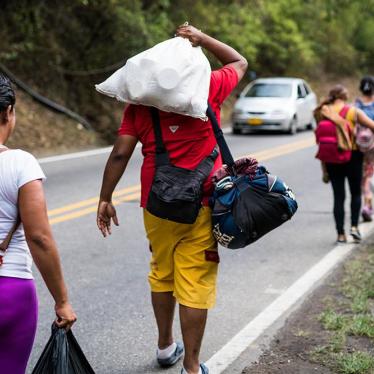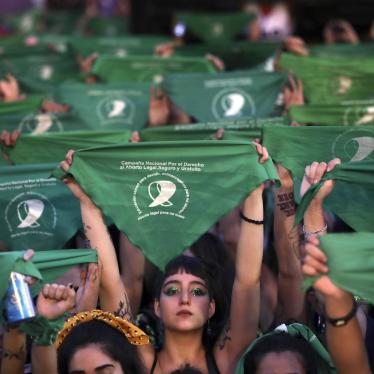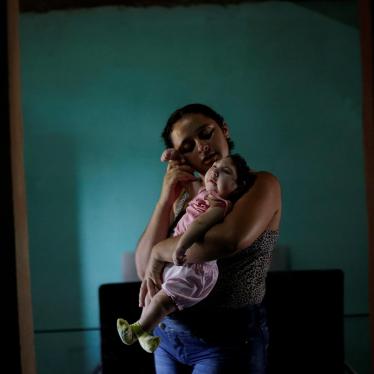(Washington, D.C.) – The combination of severe medicine and food shortages within Venezuela, together with the spread of disease across the country’s borders, amounts to a complex humanitarian emergency that requires a full-scale response by the United Nations secretary-general, researchers from Johns Hopkins Bloomberg School of Public Health and Human Rights Watch said in a report released today. The Venezuelan authorities during the presidency of Nicolás Maduro have proven unable to stem the crisis, and have in fact exacerbated it through their efforts to suppress information about the scale and urgency of the problems.
The 71-page report, “Venezuela’s Humanitarian Emergency: Large-Scale UN Response Needed to Address Health and Food Crises,” documents increased numbers of maternal and infant deaths; the unchecked spread of vaccine-preventable diseases, such as measles and diphtheria; and sharp increases in the transmission of infectious diseases such as malaria and tuberculosis in Venezuela. Available data shows high levels of food insecurity and child malnutrition, as well as of hospital admissions of malnourished children.
“No matter how hard they try, Venezuelan authorities cannot hide the reality on the ground,” said Shannon Doocy, Ph.D., associate professor of International Health at Johns Hopkins Bloomberg School of Public Health, who conducted research at Venezuela’s border. “Venezuela’s health system is in utter collapse, which, combined with widespread food shortages, is piling suffering upon suffering and putting even more Venezuelans at risk. We need UN leadership to help end this severe crisis and save lives.”
In late March 2019, the International Federation of the Red Cross announced that it was scaling-up its operations in Venezuela to provide aid to around 650,000 people. A UN report leaked to the media around the same time estimated that the population in need of support was 7 million.
UN Secretary-General António Guterres should lead efforts to develop a comprehensive humanitarian response plan for the situation inside and outside of the country, the groups said. Specifically, Guterres should:
- Officially declare that Venezuela is facing a complex humanitarian emergency, a UN term of art, which would help unlock the mobilization of sufficient resources to address the urgent needs of the Venezuelan people;
- Task the UN emergency relief coordinator, who is also head of the UN Office for the Coordination of Humanitarian Affairs (OCHA), to address Venezuela’s crisis as a top priority requiring full-scale mobilization of humanitarian relief efforts and resources; and
- Request Venezuelan authorities to grant UN staff full access to official disease, epidemiological, food security, and nutrition data so they can carry out an independent and comprehensive humanitarian needs assessment of the full scope of the crisis nationwide.
Experts from Human Rights Watch and from the Center for Humanitarian Health and the Center for Public Health and Human Rights at Johns Hopkins Bloomberg School of Public Health interviewed more than 150 people for the report. They included health care professionals, Venezuelans seeking or in need of medical care or food who had recently arrived in Colombia and Brazil, representatives from international and nongovernmental humanitarian organizations, UN officials, and Brazilian and Colombian government officials. Researchers also analyzed data on the situation inside Venezuela from official sources, hospitals, international and national organizations, and nongovernmental organizations. This was a one-year research project.
International health agencies such as the Pan American Health Organization/World Health Organization have reported that:
- Between 2008 and 2015, only a single case of measles was recorded (in 2012). Since June 2017, more than 9,300 cases of measles have been reported, with more than 6,200 confirmed.
- Venezuela did not experience a single case of diphtheria between 2006 and 2015, but more than 2,500 suspected cases have been reported since July 2016, more than 1,500 of them confirmed.
- The World Health Organization (WHO) reports that confirmed malaria cases in Venezuela have consistently increased in recent years – from fewer than 36,000 in 2009 to more than 414,000 in 2017.
- The number of reported tuberculosis cases in Venezuela increased from 6,000 in 2014 to 7,800 in 2016, and – preliminary reports indicate – more than 13,000 in 2017. The TB incidence rate has consistently increased since 2014, reaching 42 per 100,000 in 2017 – the highest in Venezuela in 40 years.
- In 2018, nearly nine of ten Venezuelans living with HIV registered by the government were not receiving ARV treatment, though the actual number of people who need ARVs is unknown.
Hunger, malnutrition, and severe food shortages are widespread in all Venezuela. In 2018, the UN’s Food and Agriculture Organization (FAO) indicated that between 2015 and 2017, nearly 12 percent of Venezuelans — 3.7 million people — were undernourished, up from fewer than 5 percent between 2008 and 2013. Unofficial surveys revealed that most Venezuelan households are food insecure and that moderate and severe acute malnutrition among children under 5 years is alarmingly high.
A massive exodus of Venezuelans – more than 3.4 million in recent years – is straining health systems in receiving countries. Data gathered in Colombia and Brazil shows a sharp rise in the number of Venezuelans seeking treatment abroad, and doctors reported that Venezuelans generally arrived after receiving limited or no treatment at home.
“The United Nations’ leadership needs to ring the alarm bell and oversee a full-scale assistance plan for Venezuela that is neutral, independent, and impartial,” said Paul Spiegel, M.D., director of the Johns Hopkins Center for Humanitarian Health and a professor in the Department of International Health at the Bloomberg School. “From a technical perspective, Venezuela is facing a complex humanitarian emergency; if the UN secretary-general does not officially recognize it, the full-scale UN involvement that is needed to address it will most likely not occur.”
While more international aid started to enter the country in 2018, humanitarian workers from international and nongovernmental organizations operating in Venezuela asserted that it does not meet the population’s urgent needs. Authorities have, in many cases, imposed obstacles to the activities of these organizations.
Venezuelan authorities are within their rights to reject particular offers of assistance, but that only heightens their responsibility to work toward alternatives that can fully address the country’s urgent needs. Efforts by Venezuelan authorities during Maduro’s presidency have failed to do so, Human Rights Watch and experts from Johns Hopkins Bloomberg School of Public Health said.
“Venezuelan authorities publicly minimize and suppress information about the crisis, and harass and retaliate against those who collect data or speak out about it, while also doing far too little to alleviate it,” said José Miguel Vivanco, Americas director at Human Rights Watch. “These authorities are accountable for the needless loss of life that their denial and obstruction have inflicted on the Venezuelan people.”
